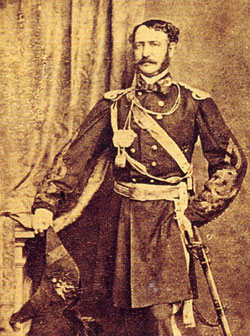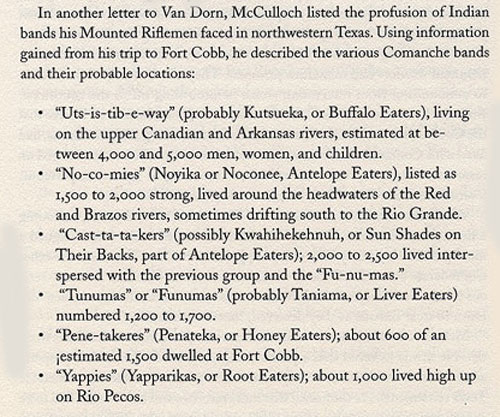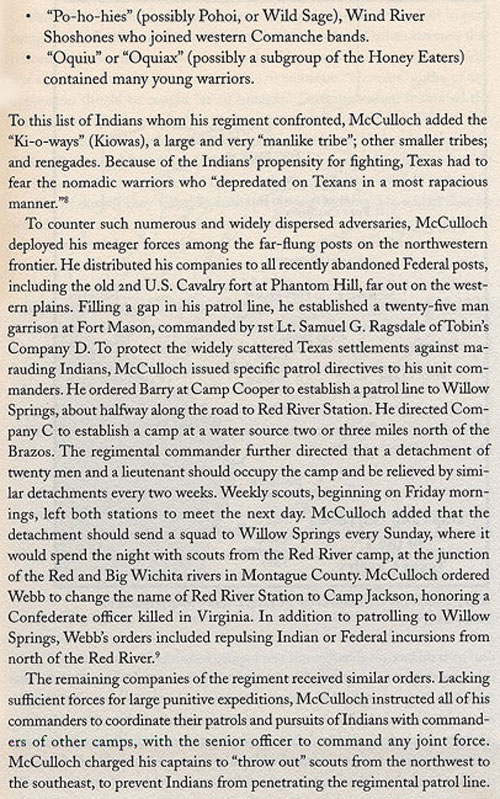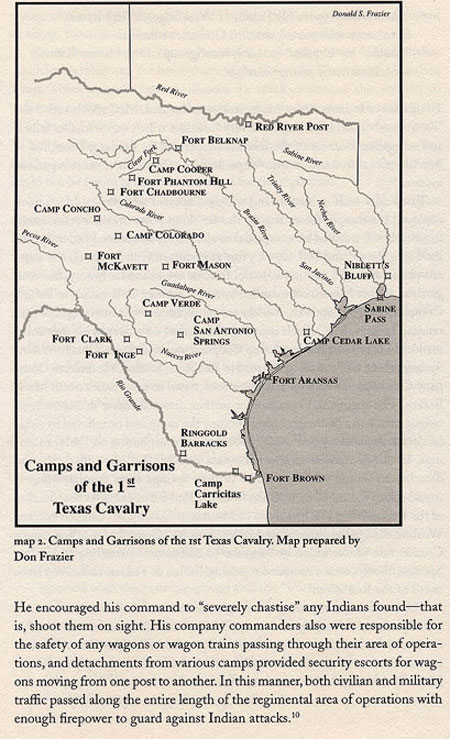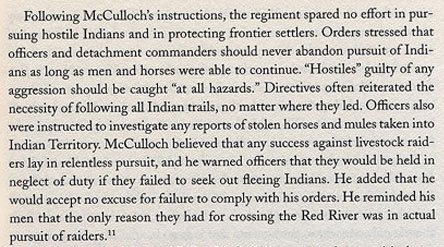The following story is from the book, Charles Goodnight, Cowman and Plainsman, by J. Evetts Haley. Upon his surrender the military situation immediately passed into the hands of three colonels designated by the Convention, 'Old Rip' Ford, Ben McCulloch, and his brother, Henry E. McCulloch. The frontier was divided into three sectors, the first of which, on the south, was assigned to Ford, the second, extending from near Fort Duncan north to Fort Chadbourne, went to Ben McCulloch, and the northern district, extending to Red River, was placed under his brother. Later, the middle and northern districts were combined under Henry McCulloch, who had already taken charge of Camps Colorado and Cooper. McCulloch placed Buck Barry and forty men at Camp Cooper, and authorized a patrol of a hundred men between there and Red River. The Secession Convention authorized each of the thirty-seven frontier counties to organize companies of not more than forty Minute Men, with patrols in constant action, while L.P. Walker, Confederate Secretary of War, commissioned Ben McCulloch to raise a regiment of mounted men. He passed the charge on to his brother, and companies of mounted volunteers were organized and sent to posts at Camp Colorado, Fort Chadbourne, and Camp Cooper. In April, Colonel Earl Van Dorn assumed command in Texas, and late in May issued an order establishing two military lines so extended as to be impossible of defense. The first, reaching from the junction of the Conchos to Red River, opposite Forts Cobb and Arbuckle, was to be under the command of Henry McCulloch and the first regiment of Texas Mounted Riflemen. The second line, under Rip Ford, extended from Fort Bliss by Forts Stockton and Lancaster to Camp Wood. Early in May, Colonel William C. Young led some two thousand Texans across Red River to take charge of Forts Arbuckle, Cobb, and Washita, and begin peace negotiations with the reserve Indians. The Confederacy sent Albert Pike as commissioner, and Henry McCulloch and Ed Burleson crossed the river to facilitate negotiations. Treaties were made with some of the tribes, but many of the wild Indians had already fled. McCulloch decided to strike into the Indian country to treat with them for peace with Texas and the Confederacy. He took twelve or fifteen men, and, with Goodnight as guide, rode north and west from Belknap. In the Buck Creek country of the Panhandle, north of Red River, he found the Indians in camp, following the drift of the buffalo, and met Satank and Satanta, the notorious Kiowa leaders, and Lone Wolf, Red Bear, and Eagle Chief, of the Comanches. But according to Goodnight: 'The Comanches flatly refused to join the Confederacy, saying we Texans were heap rich in cattle and horses, and that they preferred to fight us and steal from us and trade to Mexico-which they did. We were at the Indian camp only a day and night-there was no use staying with the buggers.' By the middle of March, some semblance of quiet was enjoyed by the frontier, and hundreds of settlers were returning to their homes, planting crops, and again tending their cattle. Yet there was grave fear of war, and the Overland Trail was crowded with caravans bound to California, getting away from the South. By June the Overland Mail had stopped, and there was agitation for private service from North Texas to Fort Smith, Arkansas. (For more of the story, see below). In spite of the defense lines, there were, in the fall of 1861, numerous complaints to Governor Edward Clark of the 'great number of Indian depredations.' While always joining in pursuit of those raiders striking the Belknap country, Goodnight had not yet joined the forces, but was working on the Keechi range. An accident delayed his entering the service. ...With the Confederacy too busy to defend the frontier, the Legislature saw that more permanent organization was needed. On December 21, 1861, a law was passed creating the famous Frontier Regiment of ten companies of rangers, to be stationed along the front from Brownsville to Red River, and discontinuing the Minute Men after the first of March. Governor F.R. Lubbock appointed Colonel James M. Norris, of Waco, to its command. Many seasoned old Indian fighters on the outer edge, beyond the plantation and slaveholding regions, being less enthusiastic over secession than Texans to the east, decided as did Goodnight and Lane. Captain Jack Cureton immediately went into the service and settled down to fight Indians for the period of the war. Norris placed half of Goodnight's company at Camp Cureton, on the Trinity, and the other half remained in camp near Belknap. Throughout most of the war, Goodnight was to be located at the old army post. By March, 1862, Cureton's company was well organized; in April he had one hundred and twelve men, and J.A. Hall and Joe A. Woolfork became first and second lieutenants. The 'cream of the frontier' joined, and the company was sworn in at Belknap by J.W. Trockmorton. To the south, Captain John Salmon's company occupied Camp Breckenridge, upon Gunsolus Creek, and about a day's ride below was another camp, and so the line ran into the south until it abutted against Mexico, station after station for Indian fighting men. It was a line much shorter than that laid out by Van Dorn, and constituted the first chain of defense since the Federal troops had been withdrawn. Only nine companies were enlisted, but with 1089 men the line from end to end was to be patrolled at least every other day. Along this patrol the rangers were to report any ingoing Indian trail, and arouse the forces up and down the line, while a party pursued the Indians. It was not a sure defense, for raiders sometimes came into the settlements on foot, leaving no trail for a jogging horseman to catch, and, once mounted on fresh horses inside, cut loose their hounds of war and hell and hit a high lope for the open country. Not often were they caught. Accompanying Norris upon his first survey of the line of defense were Lieutenant-Colonel A.T. Obenchain and Major J.E. McCord. Norris was not a fighting man and was a misfit in the service. McCord, located at Camp Colorado, rarely if even came north. Though Obenchain wished an active part in handling the regiment-particularly Cureton's company-Cureton himself was the strength of the northwest fringe, being referred to as the 'Jack Hays of the frontier.' Goodnight described him as 'a splendid frontiersman who had no military training except what he had picked up. But he was a fine man, an excellent Indian fighter, and a very popular commander.' The organization was effected, and when Cureton left the settlements and headed into Indian country, in advance of his column scouted Charlie Goodnight, straight, slim, and strong. Across the fork of his saddle swung his fine long rifle, and engraved upon its barrel was his appropriate sentiment: 'Seek ye first the kingdom of God and His righteousness, and all these things shall be added unto you.' But at which end of the gun did the legend apply? …Reorganization of the rangers early the following year into 'The Mounted Regiment of the Texas State Troops' resulted in McCord's promotion to the command, following Colonel Norris's resignation. The colorful Buck Barry-fighting Texan, hater of Indians, lover of outdoor life, and unique wilderness character-assumed command of the upper border. He was a natural leader and served the regiment faithfully and well until the break-up came. …Because Texas had not the resources to support an elaborate scheme of frontier defense, Governor F.R. Lubbock, on the first day of October, 1862, directed Adjutant-General J.Y. Dashiell to tender the Frontier Regiment to the Confederacy. It was accepted by the commander of the Military Department of Texas and Arizona upon condition that it be reorganized and tendered without restrictions as to service and command. In February, 1863, it was reorganized as The Mounted Regiment of Texas State Troops, and in March the Legislature authorized the Governor to tender it to the South upon one condition of service-that it 'remain upon the Indian frontier of the State of Texas.'
|
||||
|
||||
